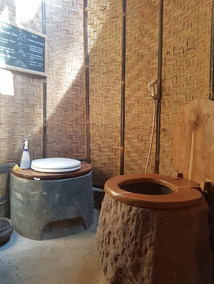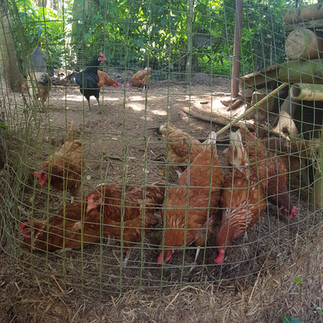Things I've Learned at a Permaculture Farm
- Coco Tan

- Jun 2, 2021
- 4 min read
Updated: Jun 20, 2021
At the Kulkul Farm at Green School, Bali Indonesia

Back in 2018, I had the privilege of being able to join the permaculture design course at the Kulkul farm in Bali, Indonesia. It was one of the most memorable experiences in my life that still gives me hope to a more sustainable future.
What is permaculture you may ask? Permaculture comes from the word "permanent" and "agriculture". It is the practice of designing sustainable human habitats by following nature's patterns and creating closed loop ecosystems. It has a set of ethics and principles that will help you know what to do with the land around you and guide you into co-existing peacefully with nature in this modern age.
The Kulkul farm is part of the famous Green School Bali who are the pioneers of redefining education, modern bamboo architecture and sustainability. It has been my dream to go there ever since I saw John and Elora Hardy's TED Talk many years ago and being there was nothing short of magical. "Kulkul" refers to the sound that the Balinese bamboo drum makes as a call to gather and we got to hear this drum all throughout the course.
Orin and Maria Hardy started the farm with the intention of inspiring and empowering both local Balinese and visiting travelers to live a life connected to the natural world and traditional ways of living. The 14 days I spent in their farm not only inspired me but also thought me about the importance of a like-minded community. Being with a soul tribe with a common goal made me feel like anything was possible and that includes building a greener and more sustainable future.
Each Permaculture Design Course (PDC) is different because Orin and Maria always get various guest speakers to facilitate the workshop. My batch had Chris Shanks who is a teacher and permaculture enthusiast specializing in whole systems design, ethno-botany, horticulture, mycology, and ecology. He has studied ecosystems and cultural anthropology in Spain, the Bahamas, Costa Rica, Mexico, Guatemala, Panama, Nicaragua, Hawaii, and both coasts of the United States.
"Being with a soul tribe with a common goal made me feel like anything was possible and that includes building a greener and more sustainable future."
Things We Learned
Permaculture principles and definitions
Principles in action
Mushroom production
Soils and fertility
Composting
Bio-intensive gardening
Agroforestry
Reading the landscape and land designs
Water harvesting and grey water systems
Appropriate technology and alternative energy systems
Animals in the system
Bamboo and natural building
Fermentations and natural apothecary
…and many more!
So some of you might be thinking, how is this different from organic farming? Organic farming refers to the absence GMO's, chemical pesticides and fertilizers while permaculture refers to the entire ecosystem and creating that balance with nature. All of this involves us observing and learning from nature. One example is the rice terraces. We maximized the slopes of the mountains and created edges and terraces to be able to catch, store and use that water as gravity lets it flow down. Another example is Aquaponics which refers to the growing aquaculture and cycling that water to grow agriculture as well in a closed loop system. Nature has a lot it can teach us and we sometimes forget that.
My Experience
Living in the farm for 14 days surrounded by people from all over the world was truly eye opening. We lived in bamboo yurts, used compost toilets, ate a mostly plant based diet and exercised everyday. It was cool and quiet in the evenings with nature as my background music. My body naturally adjusted to the circadian rhythm as we woke up at 7am and slept around 10pm. We were lucky enough to have classmates who had their own exercise routine and we were free to join them and choose a different practice each day. In some mornings we would jog around the forest or practice yoga while some days we do an animal flow circuit training. I never felt so healthy in my entire life and this helped convinced me that being on a plant based diet gives me more energy throughout the day and the best part was that it was so easy because of the community I surrounded myself with.
Compost Toilets
I was hesitant at first to use the compost toilet but surprisingly, it wasn't smelly at all. How it works is that you "flush" by scooping some wood chips and saw dust which is available right next to you and inoculate it with the liquid fertilizer, EM4, to help break it down faster. The wood chips and saw dust actually absorb most of the smell and they always make sure to have a special Balinese incense lit throughout the day. The waste goes into a drum underground which is regularly collected to be further composted in a separate area. Did you know that we waste about 6-12 liters of clean water with every flush? Think of the amount of water we could save with each flush if we started using compost toilets.
"It was so easy because of the community I surrounded myself with."
My Intentions
I took this course because I have always wanted my own farm to table property and as I go searching for my perfect place in this earth, I now know what to look for and how to work with nature. At the end of the PDC, we had a final project where in we had to design an actual piece of land for a pretend client according to their needs. I was lucky enough to get the same type of client brief as my own dream wellness resort.
Nothing is by accident. Out of the 20 students in my class from 16 different countries, there were about 7 birthday celebrants including myself. I learned a lot and made a lot of inspiring friends from all over the world and I am looking forward to being a few steps closer to manifesting my dreams.
Find out more about Orin and Maria at https://kulkulfarmbali.com/ Currently, they are not organizing any PDC's due to the pandemic and focusing more on the online Bamboo U courses which you can also find in their website.
Permaculture Principles
Permaculture in the Philippines


























































































Comments